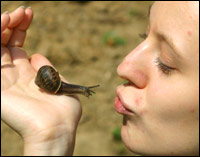Dear Umbra,
Recently, an article in my newspaper stated that federal and state guidelines allow the spraying of “organic pesticides” on organic crops. I thought organic crops were pesticide-free. I am very disappointed to find out that there are sanctioned “organic pesticides” which, with probably little to no independently researched information, may or may not pose a risk to my health. Tell me the paper got it wrong (please)!
Art
Bakersfield, Calif.
Dearest Art,
Nope. Let me try to soften the letdown, though. What is a pesticide? In the simplest view, it is a substance that kills vegetative or animal pests. It’s not realistic to expect farmers to eschew killing pests, and I doubt that you have lived your entire life without killing a pest yourself.

You’ve got snail.
Photo: iStockphoto.
There are pesticides, and there are pesticides. White vinegar is a pesticide, as you can easily confirm by pouring it on a weed at home. It’s a chemical. There are also infamous pesticides such as organophosphates — these are more the type of chemicals that preoccupy you, I believe. Organophosphates kill insects by stopping an enzyme from regulating a neurotransmitter; if the neurotransmitter is not regulated, the nerves spaz out and get tired, resulting in weakness, paralysis, and — the farmer hopes — death.
Organophosphates are quite useful because they are “broad spectrum,” i.e., kill many types of insect. They can also be quite dangerous if used incorrectly, and many of us believe they are dangerous even if used correctly, because their neural damage is not limited to insects. They are the largest group of pesticides, with 60 million pounds spread annually in the U.S. I’d rather not subject land, agricultural workers, and myself to organophosphates. Pesticides are widely used in conventional ag because they work well in the short term and don’t take much effort (read: money) compared to paying people to weed. It’s one reason you pay less for conventional food.
Are the pesticides used by organic farmers comparable to those used in conventional agriculture? You can peruse the list of allowable substances if you wish, scrolling down the National Organic Program standards to the section beginning at 205.600, and you’ll see that the pesticides available to organic farmers are quite limited. (Or maybe you won’t see that until, say, you check out the list of new active ingredients registered by the U.S. EPA’s pesticide program in recent years and do a little comparing.) Only a few synthetics are allowed in organic farming, and those used for dire situations come with strict guidelines.
Because organic farmers are restricted in what they can use to kill pests — and want to be restricted — they do what they can to avoid pests in the first place, using crop rotation, intercropping, beneficial insects, tillage, and other high-labor techniques to reduce infestation. When they do spray, it’s the last resort, it’s going to be a chemical, and its point will be to kill. You can’t get around the facts, but you can celebrate the reduced toxicity. Hurrah!
As my regular readers know, I advocate getting to know your producer as the path to a better understanding of how your food is grown. You live in California, man! I find four Bakersfield farmers’ markets on the USDA list, three of which are year-round. While I do not recommend you approach growers with the exact question you wrote to me, if you find a nonconfrontational way to phrase it — “Can you explain the difference between organic and non-organic pesticides? I’ve been confused” — and approach a farmer during a slow time, I think you’ll get a reassuring and helpful response. Or you can grow your own food and try not to kill a single slug in the process.
Baitily,
Umbra

